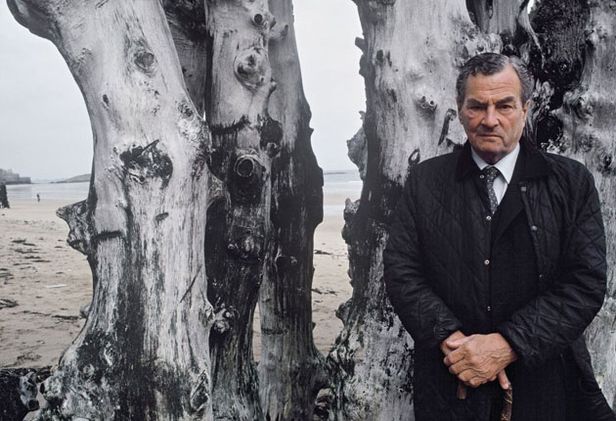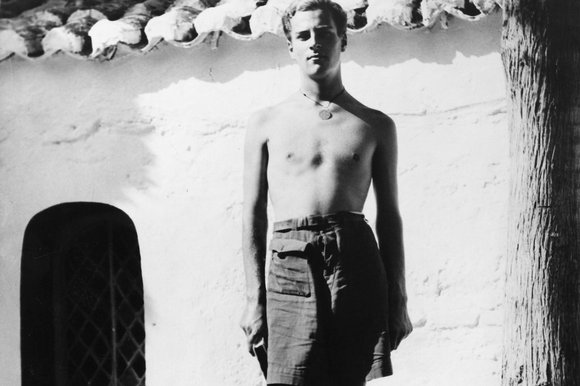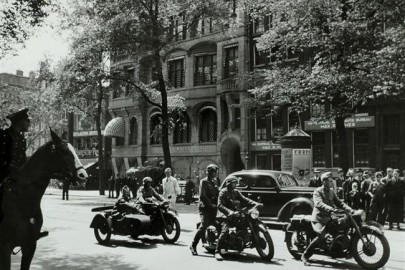In the second of today’s reviews, Elberry shares his thoughts on this uncompleted ‘third book’ from Fermor’s famous european journey.
There were an archbishop and several bishops and archimandrites besides the abbot and his retinue. They officiated in copes as stiff and brilliant as beetles’ wings, and the higher clergy, coiffed with globular gold mitres the size of pumpkins and glistening with gems, leaned on croziers topped with twin coiling snakes. They evolved and chanted in aromatic clouds of smoke diagonally pierced by sun shafts. When all was over, a compact crocodile of votaries shuffled its way round the church to kiss St Ivan’s ikon and his thaumaturgic hand, black now as a briar root, inside its jewelled reliquary.
Beyond the grave, Patrick Leigh Fermor continues to explore and write. And rejoice: his posthumous Broken Road is as good as its predecessors. Briefly, the 18-year-old hobbit left the Shire in 1933, electing to walk through the wilds east and south to Constantinople. Why? For adventure, that which had impelled Bilbo Baggins to venture out at almost the same time. There is something distinctly English about Fermor, falling into the camp of Tolkien’s adventuring hobbits, or the Countess of Ranfurly. For Tolkien, stolid hobbits (Englishmen of the type who rarely exist now) will tend to spontaneously develop a taste for adventures, for the undiscovered road. Tolkien takes it so much for granted that, re-reading Tolkien in 2001, I felt I was missing something. Fermor completes some of the picture. Despite the generational gap, both men write from a similar culture, that of the eccentric, wilful, partly pagan, partly Christian English upper middle class of the early to mid 20th Century. These are men of high education with a relish for hardship and exploration, for new languages, for difficulty and danger; men with an absolute loathing for totalitarianism, whether Nazi or Communist – hence, men utterly at odds with the modern world.
In the two prequels, Fermor has already tramped from Holland, through an early Nazi Germany, across Hungary and Transylvania and up to the Iron Gates. He now continues through Rumania, Bulgaria, and Greece. There are no Nazgül in sight but they are very much in the background, in the form first of Nazism then of Communism. For unlike The Lord of the Rings, there is no happy ending – one could say, in the lands Fermor treads, Sauron was defeated but Saruman ascended to take his place with equal tyranny:
Obviously, I had little grasp of what the war entailed and still less prophetic flair, for when I set off for England in September 1939 to join the army, I left all my books and papers in this house in Moravia. I had planned to return there when the war was over. But when the war ended, this house, like most of the places in this narrative, was out of bounds beyond the Iron Curtain. It had been smitten by fire and earthquake and its inhabitants scattered, imprisoned and driven from their homes – but, alas, not over the frontiers of Rumania into the free world.
Fermor is careful to disguise the identities of those who sheltered him in the later Soviet domains, for fear of Communist reprisals. The trilogy derives a certain poignancy from its Alan Furstian setting: mainland Europe in the 30s, soon to go up in the flames of Nazism then Communism.
We are always aware of the layerings of history (war) as Fermor crosses borders and learns languages. The fervour of nationalist hatreds would be odd in England, at least when being an island had some protective significance; but hatred seems the norm in 1930s Eastern Europe, as Fermor’s acquaintances roar with applause at the latest political assassination and assure him that whatever country he’s just come from is full of bad men and monsters. Reading this, I realise how apt was Tolkien’s vision of England as the Shire – a place set apart and warded from the brutality and chaos of the rest of the world. Fermor, naturally, is gentlemanly about it; for one thing, he’s a stranger here, a ranger tramping the moors. There are many Tolkien-esque scrapes where he nearly dies after falling down a mountain and what not:
There was no question of spending the night in the pass, as a fast and biting wind was sweeping across it. There was neither shelter nor cover. It was bleak as a desert. After walking a couple of miles I espied with joy a wayside house in the rising moonshine. My approach unleashed a frenzy of barking from a white sheepdog. As I reached the front door, the line of light went out under the shutters. I knocked on the door and the shutter, explaining myself in Bulgarian as lame as my foot. ‘I am an English traveller, my foot is bad. There is a big cold wind (gulemo studeno). May I come in please?’ I could hear whispers indoors where there had been talk before; then there was silence, except for the barking and snarling of this slavering hell-hound only a few precarious feet away. The repetition of my dismal litany gradually lost all conviction. At last when all hope had drained away, I lurched on northwards and downhill, swearing, comminating and shouting aloud, blinded with tears of fury and frustration.
Later, he nearly dies of cold and exhaustion before stumbling upon a fireside cave. Here, he is revived by a party of sailors and shepherds:
They were a wild-looking lot. Six of them were dressed in the customary heavy, homespun earth-brown or dark blue, but so parched and tattered that it was hard to distinguish the parent colour, and shod in the usual crusted apparatus of swaddles and thongs and canoe-tipped rawhide moccasins, one of which looked as if it had been abraded for several decades. Knives were stuck into their voluminous scarlet sashes, and they were hatted like me, in battered and threadbare busbies that had moulted most of their fur. An old man with a tangled white beard seemed to be the dominating figure. A second group of four wore more ordinary clothes, though equally patched and worn, and blue jerseys pocked with holes. Ancient sailors’ caps with once-shiny peaks were askew on their matted hair. They all of them looked exactly what they were: shepherds and seamen.
I was reminded of Tolkien’s The Window on the West chapter, with the hobbits seized then succoured by the rangers of Gondor. And as with the hobbits, Fermor alternates between nearly dying in the wild, trying his luck with the peasants, and being lavishly hosted by the gentry; some of the pleasure of the book comes from these extremes; so here he lodges with a diplomat:
No greater solace in a strange capital, after rough or irregular travel, can be compared to staying in a bachelor diplomatist’s flat (though some archaeologists run them close), especially if they are as hospitable and welcoming as my present host. (‘Please get at all these,’ with a wave towards huge cigarette boxes and a glittering drinks table, ‘we get them practically free. Do for heaven’s sake smoke those cigars, too. I don’t know what to do with them all, and please tell Maria if you want anything – any washing, luncheon – she gets depressed if there’s nothing to do…’) Empty all day, it was the dreamed-of refuge for writing and reading, encyclopaedias piling up on divans in warm rooms overlooking the autumn leaves of the quiet street.
Pleasing that Fermor alternates between getting drunk, learning languages, and reading in joyous isolation; later, Fermor reads Byron for hours in Greek monasteries before heading out again into the nearly-uninhabited wild. After tramping about for months, our hobbit becomes half-ranger, a creature of the wild:
I put down the large basket of figs I had bought as a present to my hosts – and a tortoise I had found by the roadside – and let myself into the Tollintons’ flat as the cathedral of Alexander Nevsky tolled eleven. The soft lamplight, afloat with the civilized murmur of a dinner party, revealed a shirt front in an armchair here and there, the glint of patent leather shoes, women’s long dresses, and golden discs of brandy revolving in the bottom of balloon glasses. The coffee pouring from the spout to cup in the hands of Ivan, the giant Cossack butler, dried up in mid-trajectory, the golden discs, arrested by this horrible intruding apparition, stopped rotating in their balloon glasses. A moment of consternation on one side, dismay on the other, froze all. It was quickly thawed by Judith Tollinton’s kind voice – ‘Oh good, there you are, just in time for the brandy’ – and the spell was broken.”
This is pure Countess of Ranfurly; far from the presently fashionable image of the British upper classes as terrible class-bound fascist snobs who demand everyone be in evening dress and no backtalk from the servants. Fermor is just one of the many British middle-upper class who moved freely from world to world, belonging in all, though he is apt to seem a little startling when he turns up after months on the road. I was reminded of Tolkien’s rangers; their silent service protects the Shire from the East; and they periodically turn up in civilised lands to smoke a pipe:
Suddenly Frodo noticed that a strange-looking weather-beaten man, sitting in the shadows near the wall, was also listening intently to the hobbit-talk. He had a tall tankard in front of him, and was smoking a long-stemmed pipe curiously carved. His legs were stretched out before him, showing high boots of supple leather that fitted him well, but had seem much wear and were now caved with mud. A travel-stained cloak of heavy dark-green cloth was drawn close about him, and in spite of the heat of the room he wore a hood that overshadowed his face; but the gleam of his eyes could be seen as he watched the hobbits.
‘Who is that?’ Frodo asked, when he got a chance to whisper to Mr. Butterbur. ‘I don’t think you introduced him?’
‘Him?’ said the landlord in an answering whisper, cocking an eye without turning his head. ‘I don’t rightly know. He is one of the wandering folk – Rangers we call them. He seldom talks: not but what he can tell a rare tale when he has the mind. He disappears for a month, or a year, and then he pops up again. He was in and out pretty often last spring; but I haven’t seen him about lately. What his right name is I’ve never heard: but he’s known round here as Strider. Goes about here at a great pace on his long shanks; though he don’t tell nobody what cause he has to hurry.
One could see Fermor as slowly turning into one of these disreputable rangers. As with Tolkien – in real life and in his books – an adventurous hobbit is apt also for espionage. And so, one should not be too surprised if Tolkien was more than a don and author, nor that Fermor worked for SOE in the war, gadding about kidnapping Nazi Generals.
Fermor’s book is intensely concerned with the detail of human life, with that which makes life vivid and worthy of being, with that which should be protected from totalitarianism. Value is not to be found in large gestures and speeches, but – as in Tolkien – in small things, in little acts of decency, in simple hospitality, in the pleasures of food and drink and poetry and tobacco:
Delving in the bottom of my rucksack for the A Shropshire Lad my mother gave me last birthday, I found an envelope full of Capstan Navy Cut. This was a real find, and getting out my best pipe (unsmoked for nearly a month) I stuffed it full and set it alight. I’m sure the good God never breathed incense with more delight than I felt then. Pipe tobacco, after a month’s cigarette smoking, is an ecstasy too deep for words.
What better way to remember Fermor, the ranger of old Europe, the magician of words and observation? For he is dead and no doubt smoking a pipe in Valhalla with Gandalf and Strider:
‘I know what is the matter with me,’ he muttered, as he sat down by the door. ‘I need smoke! I have not tasted it since the morning before the snowstorm.’…The last thing that Pippin saw, as sleep took him, was a dark glimpse of the old wizard huddled on the floor, shielding a glowing chip in his gnarled hands between his knees. The flicker for a moment showed his sharp nose, and the puff of smoke.
With thanks to our friends at John Murray Press for the copies of Patrick Leigh Fermor’s The Broken Road. You can purchase your own copy here. To be in with a chance of winning upcoming free books, sign up to the Dabbler Book Club , or join the fabled League of Dabblers…











